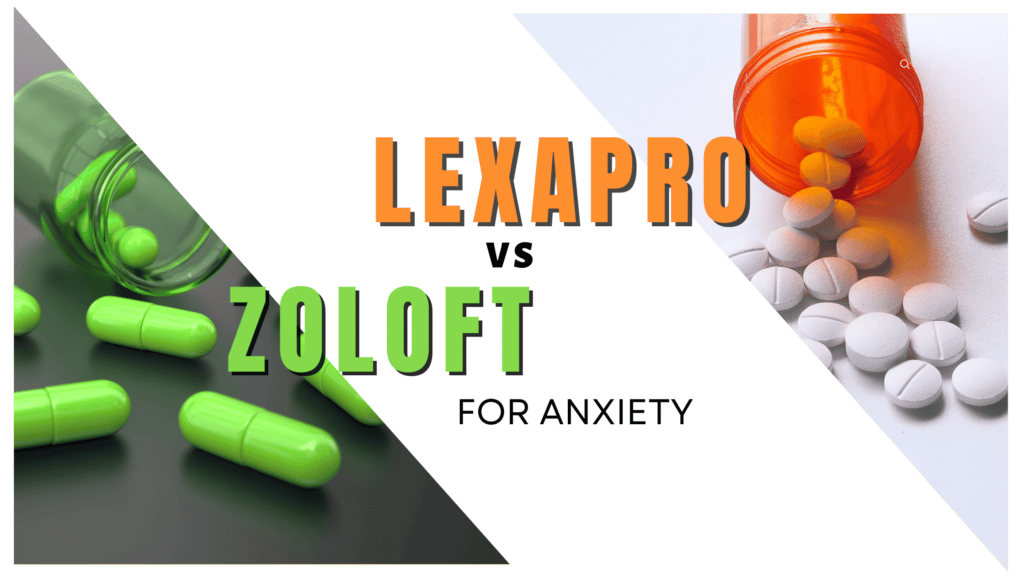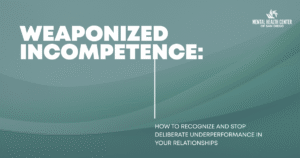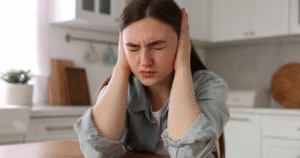When you struggle with anxiety, there are medications available. Many of these medications work similarly, for example, Lexapro vs. Zoloft for anxiety. Even though there are similarities, it can still take experimentation with the type of medication and the dose to find what’s right for you because everyone’s unique.
Getting treatment is critical. Untreated anxiety can diminish your quality of life, affect your relationships and even impact your physical health negatively, according to the National Institute of Mental Health and the Mental Health Services Administration. Anxiety is a progressive disorder when it’s not treated, meaning clinical worsening of the symptoms over time.
If you try treatments and they don’t seem to work at first, don’t get discouraged. Keep working with your care provider until you find what does work.
Understanding Anxiety Disorders
It’s normal to feel occasional anxiety in our daily lives. Anxiety crosses the line into a diagnosable mental health condition when it’s persistent and excessive. You may have extreme fear about everyday activities and scenarios.
An anxiety disorder can also include sudden, very intense fear or terror peaking within minutes, which are panic attacks.
One defining feature of a disorder versus normal anxiety is that these feelings interfere with your daily function and activities with a disorder. The feelings of fear or worry are out-of-proportion to the situation and can be long-lasting. You might find that you avoid situations or places to prevent such feelings.
Anxiety disorder symptoms start for many people when they’re children or teens and continue when they’re adults.
Anxiety symptoms might include:
- Feeling tense, restless, or nervous
- A sense of impending doom or danger
- Increased heart rate
- Rapid breathing
- Trembling
- Sweating
- Feeling tired or weak
- Problems concentrating
- Sleep disturbances
- GI (stomach and digestive) problems
- Difficulties controlling your worry
- Avoidance of things that trigger your anxiety
Mental Health Center of San Diego
Types of Anxiety Disorders
There are five predominant types of anxiety disorders, which are most commonly diagnosed. These are:
- Generalized anxiety or GAD is chronic anxiety, exaggerated worries, and fears about various things like health, money, relationships, and work.
- Obsessive-compulsive disorder or OCD is an anxiety disorder where you have recurrent obsessions. Obsessions are unwanted thoughts. Then you experience compulsions or repetitive behaviors. The repetitive behaviors are rituals you do to try and make your obsessive thoughts disappear. When you don’t perform the rituals, even though they only provide temporary relief, your anxiety worsens.
- If you have panic disorder, you experience repeated, sudden, intense fear and physical symptoms such as shortness of breath, chest pain, and dizziness. These situations are known as panic attacks.
- Post-traumatic stress disorder or PTSD is a disorder developing after exposure to something traumatic, terrifying, or life-threatening.
- Social anxiety disorder or social phobia includes symptoms of extreme self-consciousness in everyday settings. Some people fear one particular setting, while others have symptoms whenever they’re around others.
Premenstrual dysphoric disorder or PMDD is a similar medical condition with extreme mood shifts and physical symptoms like bloating and breast tenderness. Someone with PMDD might experience anxiety or panic attacks, so treatments are similar to those and other anxiety disorders.
Anxiety can occur independently or with other mental illnesses such as major depression or bipolar disorder. Having an anxiety disorder can also occur with substance use disorders.
The Causes of Anxiety
As with other mental health disorders, the causes of anxiety disorders are complex and multi-faceted. The wide range of causes can include environmental stress, family issues, relationship problems, and brain chemistry.
Anxiety disorders may stem from abnormal chemicals in the brain, such as low serotonin levels. Genetics is often a relevant factor, as having a family member with an anxiety disorder can make you more likely to have one.
Treating Anxiety Disorders
Many treatments are available for anxiety disorders, so talk to a mental health professional to find what could work for you.
For most people, the best approach is a combination of counseling or talk therapy with medication.
Counseling and Talk Therapy
Counseling, also known as talk therapy or psychotherapy, is a way to recognize the harmful thought patterns that lead to your anxious feelings and can be an effective treatment plan.
Cognitive-behavioral therapy or CBT is a particular treatment for anxiety disorder in adults and young people that’s often effective.
When you participate in CBT, the health care provider works on limiting your distorted thinking so you can then change your reactions and behaviors.
Medications
Benzodiazepines might be prescribed in rare situations for certain people with anxiety, but they’re addictive and have side effects, so they’re not used often.
Antidepressants are a group of medicines that help with depression symptoms and seem to have benefits for anxiety disorders.
Serotonin reuptake inhibitors, or SSRIs, are a newer type of antidepressant with fewer side effects than older generations. A selective serotonin reuptake inhibitor is meant to be taken long-term, and for many people, common side effects and adverse effects go away or get better over time.
A tricyclic antidepressant is older than other treatment options and is used less commonly for psychiatric conditions and psychiatric disorders.
Beta-blockers are also used for anxiety’s physical symptoms, especially panic disorders. Beta-blockers aren’t an antidepressant treatment. Instead, they’re used primarily for symptoms like high blood pressure. These medications don’t treat chemical imbalances that lead to mood disorders.
Mental Health Center of San Diego
Lifestyle Changes
Even when you’re working with a therapist or mental health provider and taking anxiety medication, they might recommend that you make lifestyle changes to help your symptoms.
Exercise and meditation can help with anxiety symptoms, as can eating a healthy diet and having a support network of friends or family you can rely on.
Lexapro vs. Zoloft For Anxiety—How Do They Compare?
Two of the most common prescriptions for mental health patients with anxiety are Lexapro and Zoloft, which tend to have more similarities than differences.
What is Lexapro?
Lexapro is a brand-name prescription drug. The generic name is escitalopram, an antidepressant approved for the treatment of major depressive disorder and generalized anxiety disorder.
Off-label it’s sometimes prescribed for conditions such as OCD and PTSD.
For people taking this medicine, some improvements in symptoms, including sleep and energy levels, may show in one to two weeks, but full improvement usually requires 6-8 weeks to see.
What Is Zoloft?
Zoloft or sertraline is an antidepressant medication approved to treat major depressive disorder, PTSD, panic disorder, and social anxiety disorder. Zoloft also has approval for the treatment of OCD.
Comparing Lexapro Vs. Zoloft for Anxiety
The following are some of the similarities we see as we compare Lexapro vs. Zoloft for anxiety:
- Both Lexapro and Zoloft are antidepressant medications and a class of medications called SSRIs.
- They both have a liquid form available as well as a generic form.
- SSRIs work by increasing the activity of serotonin in your brain, which helps maintain your mood to treat depression and other mental disorders.
- Each of these medications has similar drug interactions, so you must review your full medical history and list any prescription or over-the-counter medications to avoid potential adverse reactions.
- Both are long-term treatments.
- The side effects of both Lexapro and Zoloft are similar. They can include sleepiness, dizziness, problems sleeping, and sexual problems like lower sex drive, erectile dysfunction, and similar sexual side effects and sexual dysfunctions.
- Allergic reactions are possible with both medicines and should be monitored when starting a new treatment.
- Lexapro and Zoloft are both antidepressants with less of a likelihood of causing weight gain than other similar antidepressant medication options and psychiatric medications.
- Both prescriptions can cause withdrawal symptoms if you suddenly stop taking them without tapering down and gradually reducing the dosage.
- Zoloft and Lexapro are Category C drugs. There isn’t enough evidence to determine whether these antidepressant and anti-anxiety medications are safe during pregnancy or breastfeeding or could have toxic effects leading to congenital disabilities. If you are thinking of becoming pregnant or worried about blood levels of a medication passing to your baby in breast milk, only get medical advice from healthcare professionals. They’ll go over your medical history and situation and determine whether the benefits of continuing your long-term treatment with the medication outweigh the possible side effects of prescription drugs during pregnancy or breastfeeding. The use of antidepressants during pregnancy is decided on a case-by-case basis.
Differences between Lexapro and Zoloft
Both medicines also come with a black box warning about the risk of suicide in younger people taking these prescription medications. This is rare, but a healthcare provider should monitor for suicidal behavior in children or teens when taking antidepressant medications to treat psychiatric disorders. A history of suicide or risky behaviors should be discussed with a health care provider for guidance before taking antidepressants for any mental illness.
- Zoloft isn’t approved to treat generalized anxiety disorder, but Lexapro is
- Zoloft is approved for panic disorder, OCD, PTSD, and social anxiety disorder, while Lexapro isn’t
- Constipation is a potential side effect of Lexapro but not Zoloft
Lexapro and Zoloft also carry the risk of serotonin syndrome. When your serotonin levels get too high, you may experience potentially dangerous side effects and need medical attention immediately.
Mental Health Center of San Diego
Anxiety Treatment in San Diego, CA
We’re here if you think you have anxiety symptoms or other mental health disorders. We can discuss medications and therapy and create a tailored treatment approach that’s individualized to you. If you have questions or concerns or want to learn more, contact the Mental Health Center of San Diego team today by calling (858) 258-9883.
We can talk more about mental health treatment, go over a full list of side effects for recommended medications to treat generalized anxiety disorder or other anxiety disorders and help in any way you’re comfortable.









